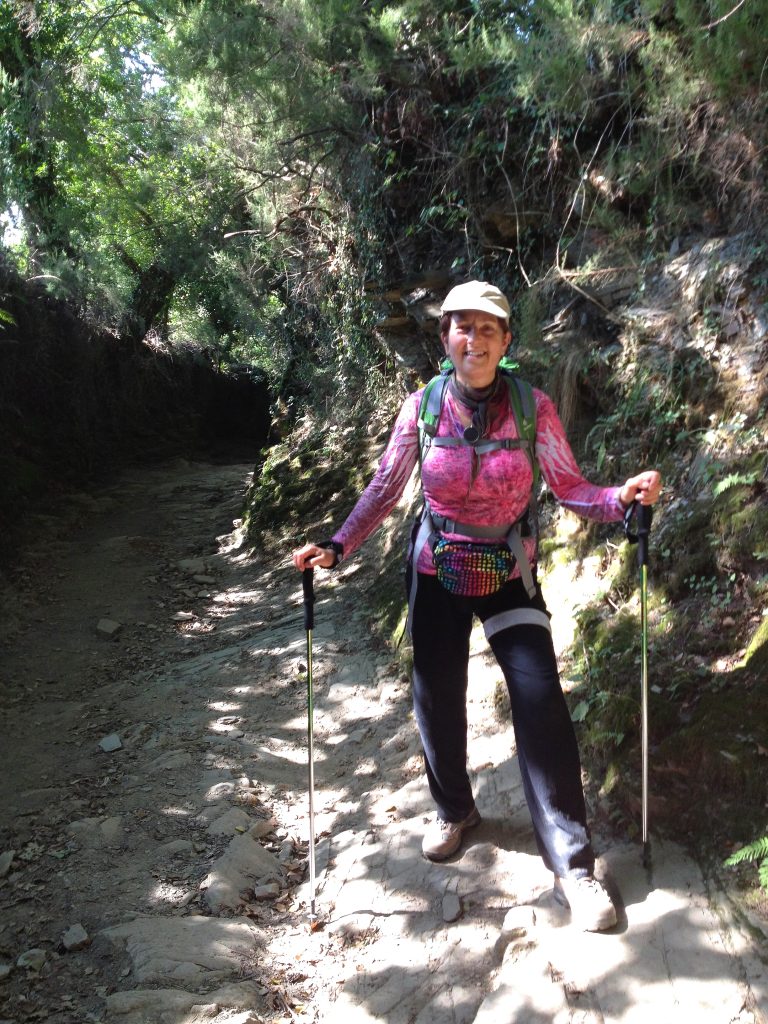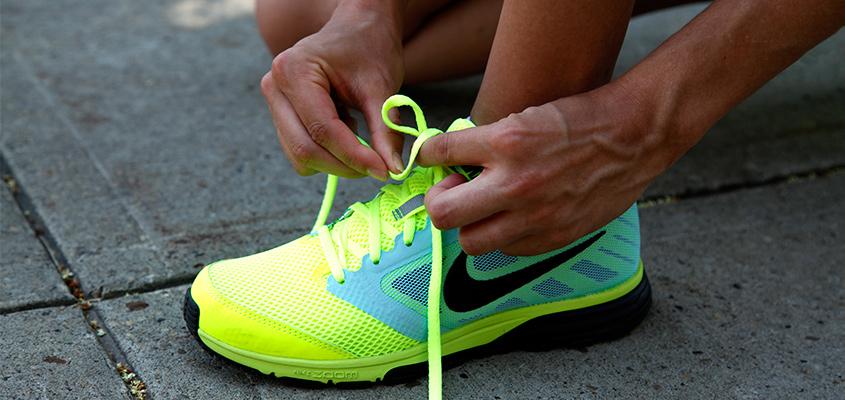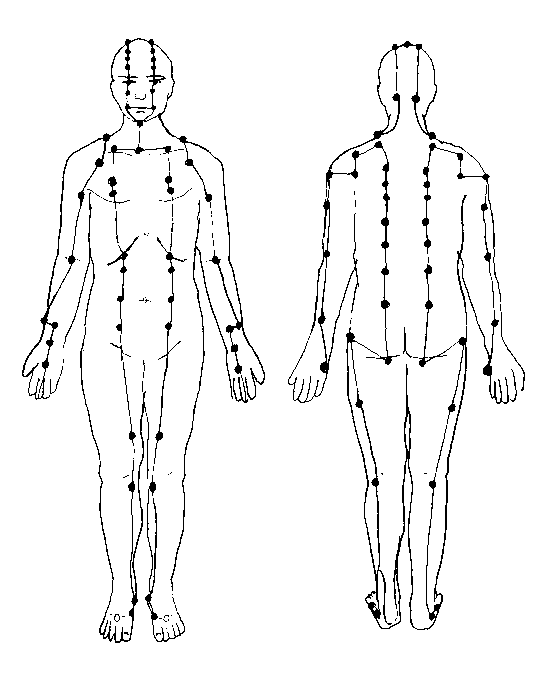
By Jane Barthelemy.
I learned an important lesson while trekking on the Camino in Spain. I walked 125 km in 8 days, which is about 15 km per day. Some days it was 25 km, some days just 8. Oh yes, my body was tired, however my mind and spirit felt total joy and freedom! I walked carefully to stay balanced. My skeleton and musculature were gently realigned each day. Even better, I enjoyed a time of peace, a chance to be with myself away from WiFi, computer, and cell phone. I was weary and my feet hurt, however at the end of the road when I arrived in Santiago and the ocean at Finisterre, I felt AWESOME! I was energized and happy. That trip was in 2012, but I never forgot about walking as my main medicine.
Our bodies are genetically designed to walk. Walking is one of the most primal movements known to man. Bipedal movement is part of our genetic heritage. Form follows function, and our bodies developed in such a way that walking is essential to health. Walking 30 to 45 minutes each day can help prevent Alzheimer’s, improve muscle tone, lower blood pressure, promote colon health, improve your mood, fight disease, control weight, strengthen your bones, prevent diabetes, and dissolve stress.
- Walking Boosts Metabolism, Aids Weight Control, Improves Brain function.
Walking speeds metabolism and burns calories even after you stop. Just two miles can increase your calorie consumption for up to 12 hours afterwards, says Dr. Eherenfried Pfeiffer, nutritionist, biochemist. Hundreds of calorie-burning muscles are utilized by walking. Walking briskly every day increases enzyme activity and other metabolic functions.The University of Michigan conducted experiments to test brain function and metabolism before and after a walk. Volunteers walked in the city or through a nearby arboretum. Dr. John Jonides, professor of psychology and neuroscience, published the study in Psychological Science. He found that “when the participants returned from the nature walk, they showed a 20% overall improvement in brain function, memory and attention, but after the urban walks showed no improvement at all.” - Walking Tones Your Muscles
Walking tones up legs, bums, and tums. It give definition to your calves, quads, and hamstrings, while lifting your glutes. If you walk with good posture, you’ll also tone your abs and waist.
- Dissolves Stress and Anxiety
Stress is part of all our lives. The movement of walking massages the organs, and helps to process and digest emotional experiences. As we breathe and the diaphragm contracts, anxiety, stress and negative emotions can dissolve, move out of the tissues to be eliminated from the body. All the organs are massaged during a walk: Lungs, heart, stomach, intestines, liver, bladder and kidneys. Regular walking can remove stuck emotions associated with constipation.
- Walking Renews the Spirit
Walking elevates your mood, and lifts depression. Walking in Nature as opposed to the city has been shown to result in even greater health improvements. It can reduce sleep apnea, chronic pain, asthma, rheumatoid arthritis, depression, ADD, PMS, hypertension, and heart rate variability. Walking in Nature stimulates the influx of free electrons from the Earth’s surface to neutralize free radicals and reduce inflammation, which is at the root of many health conditions and accelerated aging. Sunlight, Earth, Air, Water, Moon, and Sky raise your level of harmony and attunement. They harmonize mind and body, reducing reactions to excess stimulation in the environment. In this state you are less likely to experience conflict, disorientation, sadness, or depression.
- Stimulates your Brain and Meridians
As the legs move in opposition to the arms, called the “cross-crawl”, the cortices of the brain are activated. This simple exercise balances left and right brain hemispheres. This in turn benefits every function in the mind and body. Two important extraordinary meridians, Yin Qiao Mai and Yang Qiao Mai, play an important role in the flow of Qi up from the Earth into the body. These meridians separate humans from animals, as humans walk upright. Earth energy enters at the heel, travels up the sides of the body to the inner canthus (inner corner) of the eyes (BL-1), around the cranium and enters the brain at the Fengfu point (DU-16) in the center of the back of the cranium. Walking fills these meridians with nourishing Qi from the Earth. This sets your body biorhythms, builds strong protective Wei Qi, and balances the nervous system.
- Walking Strengthens Bones
Weight-bearing exercise has a positive impact upon the strength and health of your bones and joints. The Arthritis Foundation cites that “Walking shores up your bones. It can stop the loss of bone mass in osteoporosis.” They cite a study of older women showing that “30 minutes of walking each day reduced their risk of hip fractures by 40%.” - Improves Blood Circulation, Lowers Blood Pressure
Walking improves blood circulation and breathing. All the body fluids are activated in walking. Blood, lymph, synovial fluid, and cerebral spinal fluid all begin to flow in natural ways. This enhances your vital force and your body’s ability to heal itself. Thus it can fight off inflammation, anxiety, depression, diabetes, glaucoma, metabolic imbalances and many other conditions. Researchers from Arizona State University found that three 10-minute walks each day is a smarter strategy for blood pressure control than a single 30-minute session. The exercisers who did multiple mini-sessions reduced their systolic blood pressure on that day, and also saw reductions the following day.
- Reduces Risk of Alzheimer’s, Controls Blood Sugar
Researchers found that just 15 minutes of walking after eating improved blood glucose control. And an evening walk after supper was found to lower blood sugar significantly. WebMD reports that walking 6 miles a week instead of being sedentary was linked to a 50% reduction in Alzheimer’s risk.
- Boosts Lymphatic and Immune Systems
Walking helps to flush toxins out so they can’t stick around like old laundry. There are plenty of toxins in our environment. It is our job to keep them moving through the system and out. However, when we are sedentary, these toxins can collect and accumulate in the body tissues and slow down the immune system, causing myriad diseases. A recent study found that regular walking and other exercise was linked to a 55% reduced chance of developing breast cancer.
- Promotes Intestinal health
Taking a walk after a meal burns calories, but more importantly, stimulates and improves your digestion. Brisk walking 35 to 45 minutes a day has been cited as the single best exercise for healthy bowel movements. Brisk walking in long strides helps most to move the intestinal tract. Stride out You don’t have to hit the ground hard. Just glide briskly. A study at Washington University School of Medicine has shown that active people have a 24% less risk of colon cancer compared to the less active. - Bonus Benefit: There’s one more huge health benefit of walking. It’s free!
My shadow stops to take a selfie, while trekking on the Camino de Santiago in Spain.
“Travelers, there is no path. The path does not exist. Your path is made by walking.” – Antonio Machado



